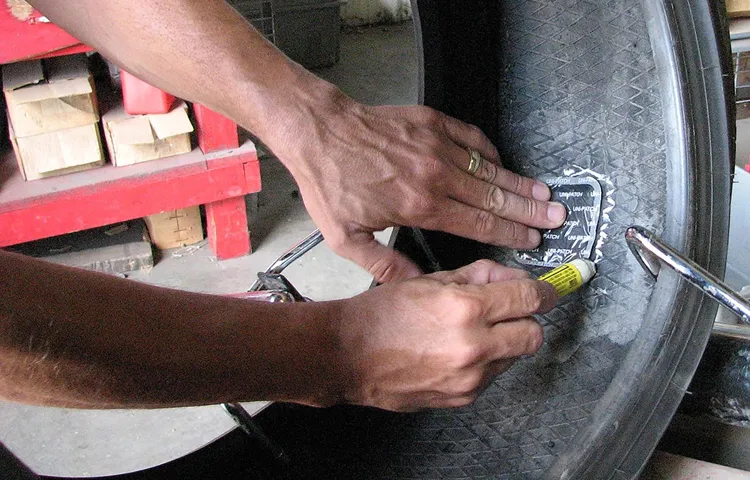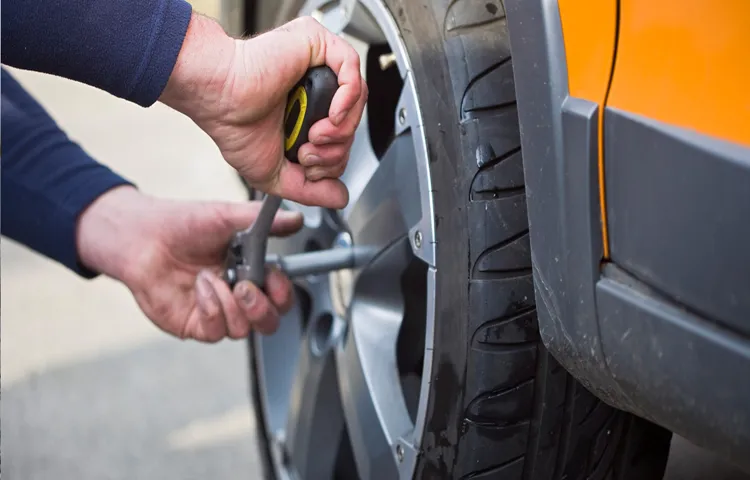If you rely on your car to get around, a flat tire can be a frustrating and costly inconvenience. Tire repair is essential to keep your vehicle safe and in good working order, but how much does it cost, and what factors should you consider when making a repair decision? In this blog, we’ll explore the ins and outs of tire repair, including the price range, the factors that affect repair costs, and the importance of timely repairs. By the end of this article, you’ll have a better understanding of what tire repair entails and be better equipped to make informed decisions about keeping your car running smoothly.
So buckle up, and let’s hit the road!
Table of Contents
Factors that Affect the Cost of Tire Repair
If you’re wondering “how much is a tire repair?”, the answer depends on a variety of factors. The first determining factor is the location where you get your tire repaired. In urban areas, the cost of tire repair is typically higher due to higher labor and rental costs.
Another important factor is the extent of the damage to the tire. If it’s simply a small puncture, the repair cost will be lower, but if the damage is more severe, such as a sidewall puncture or a puncture on the shoulder of the tire, the repair cost will be higher. The type of tire you have also plays a role in determining the cost of repair.
For instance, high-performance tires require more specialized equipment to repair, increasing the cost. Finally, warranty coverage or maintenance plans may impact the cost of tire repair. Many tire manufacturers offer limited tire warranties that may cover the cost of repairs.
So, when wondering about the cost of tire repair, consider these factors to determine the final cost.
Type and Size of Tire
The cost of tire repair can vary depending on several factors, including the type and size of the tire. Generally, larger and more specialized tires, such as those found on SUVs or high-performance sports cars, will cost more to repair than standard passenger car tires. This is because these tires require specialized equipment and expertise to properly repair.
In addition to size, the type of tire can also affect the cost of repair. For example, run-flat tires are designed to allow a vehicle to continue driving even after a puncture, but they may be more expensive to repair or replace than standard tires. Other factors that can impact tire repair costs include the severity of the damage to the tire and the brand of the tire.
It is always best to consult with a trusted tire professional to determine the most cost-effective solution for repairing or replacing your tires. Remember, investing in high-quality tires and regular maintenance can save you money in the long run by reducing the likelihood of costly repair or replacement issues down the line.

Location and Severity of Damage
When it comes to the cost of repairing your tires, there are various factors to take into account. Two of the most significant are the location and severity of the damage to the tire. If the puncture is located on the tread area, it can typically be repaired at a lower cost than damage to the sidewall, which often means the tire needs to be replaced altogether.
The severity of the damage is also an essential consideration. A small puncture can usually be repaired with a simple patch, which is a less expensive solution than having to replace the entire tire due to a large puncture or extensive damage. It’s essential to bear in mind that ignoring significant tire damage can lead to more severe problems down the line, such as tire blowouts or loss of control while driving.
Ultimately, taking care of minor tire issues early on and having your tires checked regularly can save you money in the long run and ensure your safety on the road.
Type of Repair Needed
When it comes to tire repair, there are several factors to consider that can affect the cost of the service. The type of repair needed is one of the biggest factors, as it can vary greatly depending on the severity and location of the damage. For example, a small puncture that can be easily plugged may only cost a few dollars to repair, while a larger tear or sidewall damage may require a complete tire replacement and cost much more.
Another factor is the type of tire being repaired, as some high-performance or specialty tires may require specialized repair techniques or materials. Additionally, the location of the repair shop and the skill level of the technicians can also affect the cost, as some shops may charge more for their expertise or convenience. Ultimately, it’s important to consider all of these factors when getting your tire repaired and to choose a shop that can provide quality service at a reasonable price.
Average Cost of Tire Repair
If you find yourself with a flat tire, you might be asking yourself, “how much is a tire repair going to cost me?” The answer depends on several factors, including the severity of the damage, the type of tire, and where you take it for repairs. On average, expect to pay around $20 to $40 for a simple tire puncture repair. However, if the damage is more severe and requires patching or replacement, the cost can increase to around $100 or more.
Keep in mind that delaying a tire repair can result in more significant problems later on, so it’s always best to take care of it as soon as possible. Overall, the cost of a tire repair can vary, but it’s essential to prioritize safety and ensure your vehicle is roadworthy.
Patch Repairs vs. Plug Repairs
When it comes to repairing a tire, there are two primary methods that are commonly used – patch repairs and plug repairs. Patch repairs involve removing the tire from the rim, locating the puncture, and essentially patching the hole from the inside of the tire. On the other hand, plug repairs involve inserting a rubber plug into the puncture from the outside of the tire.
Both methods are effective, but the choice depends on the size and location of the puncture. When it comes to the cost, patch repairs tend to be more expensive than plug repairs. On average, a patch repair can cost anywhere from $20 to $40, while a plug repair can cost between $10 to $20.
However, patch repairs tend to be more durable and can provide a longer-lasting fix compared to plug repairs, which may need to be replaced sooner. Ultimately, it’s important to consult with a professional to determine the best method for repairing your tire and to ensure that you’re getting a fair price for the service.
Average Cost of Patch Repair
Tire repair costs can vary depending on the type of repair needed. One of the most common types of tire repairs is a patch for a puncture. The average cost of a patch repair is typically around $20-$40.
However, this cost can vary depending on your location, the type of tire, and the severity of the puncture. It’s important to note that not all punctures can be repaired with a patch, and in some cases, a replacement tire may be necessary. It’s also important to address tire issues as soon as possible, as driving on a damaged tire can be dangerous and lead to further damage, resulting in even higher repair costs.
Overall, if you suspect you have a punctured tire, it’s best to have it inspected by a professional to determine the most appropriate and cost-effective repair solution.
Average Cost of Plug Repair
Tire repair can be a costly and inconvenient experience, but it doesn’t have to be. The average cost of plug repair varies depending on where you live and the severity of the damage. In most cases, the average cost of a tire plug repair is around $20 to $30.
However, some repair shops charge a bit more, with prices ranging up to $50. This cost is significantly lower than the cost of a new tire, which can run upwards of $100. It’s important to note that plug repairs are not always a permanent solution, as the plug can fail and cause a leak down the line.
But in most cases, a properly installed plug can last for thousands of miles and save you a significant amount of money in the process. So, if you’ve got a flat tire, don’t panic – a plug repair may be all you need to get back on the road and save you a bundle of cash in the process.
Additional Costs to Consider
“Have you ever wondered how much is a tire repair going to cost you? Well, the answer is not that straightforward. The cost of repairing a tire can vary greatly depending on several factors, such as the severity of the damage, the type of tire and the location where you get it fixed. Typically, a simple patch job can cost anywhere between $10 to $30, but if you have to replace the tire, the cost can go up to $100 or more.
Additionally, you may have to pay for other services, such as mounting, balancing and alignment, which can add another $20 to $100 to your bill. Keep in mind that some tire shops also charge extra fees for disposing of your old tire or for a road hazard warranty. So, before you hand over your keys to the mechanic, make sure you ask about all the potential costs and get a written estimate beforehand.
That way, you can budget accordingly and avoid any unexpected surprises.”
Wheel Alignment
Wheel Alignment Getting your car’s wheels properly aligned can improve your vehicle’s handling and extend tire life. However, it’s important to consider additional costs that may arise. For one, depending on the make and model of your car, a wheel alignment can be a relatively expensive service.
Additionally, depending on the condition of your car’s suspension, steering components, and tires, your mechanic may need to make additional repairs prior to performing an alignment. Any additional repairs needed can considerably increase the final cost of your overall service. It’s important to discuss these potential costs with your mechanic prior to scheduling an appointment so you can be prepared for any necessary expenses.
Despite the additional costs, a wheel alignment is a necessary investment in the long-term health and safety of your vehicle.
New Tires vs. Tire Repair
When it comes to car maintenance, taking care of your tires is essential. It’s not just a matter of safety, but it can also save you a lot of money in the long run. One of the dilemmas car owners face is whether to get new tires or repair the old ones.
While repairing your tires may seem like a cheaper solution, you need to take into account the additional costs that come with it. For instance, repairing a single puncture may seem like a simple fix, but if you have multiple punctures or sidewall damage, it may not be worth it to repair them. Additionally, repairing a damaged tire also means you’re putting more miles on an already worn tire, which could lead to further damage and a shorter overall lifespan.
In the end, it’s important to weigh the additional costs and benefits of both new tires and tire repairs to make an informed decision. By doing so, you can keep your car running smoothly and safely, without breaking the bank.
Conclusion
While the exact cost of a tire repair may vary depending on the severity of the damage and the location of the service provider, one thing is for sure – the price you pay for a repair is always cheaper than the cost of a new tire. So, next time you’re debating whether to splurge on a brand new set of wheels or simply repair that pesky flat, remember that a penny saved in tire repair is a penny earned (for more important things, like snacks and Netflix subscriptions). Happy driving, and may your tires stay flat-free!”
FAQs
What is the average cost of a tire repair?
The cost of tire repair can vary depending on the severity of the damage, but it typically ranges from $20 to $40.
Can a tire repair be done at home?
It is possible to repair a tire at home with a plug kit, but it’s recommended to have a professional perform the repair to ensure it’s done correctly.
How long does a tire repair take?
A tire repair can typically be done within 30 minutes to an hour, depending on the severity of the damage and the workload of the repair shop.
What causes tire damage that requires repair?
Tire damage can be caused by punctures from nails or other sharp objects, road hazards like potholes or debris, and even normal wear and tear.
Can all tire damage be repaired?
No, some types of tire damage, such as sidewall damage or cuts larger than a quarter inch, cannot be safely repaired and require the tire to be replaced.
Does tire repair come with a warranty?
Many tire repair shops offer a warranty on their repairs, typically ranging from 30 to 90 days, to ensure the repair holds up and doesn’t cause further damage.
How can I prevent tire damage that requires repair?
Regularly inspecting your tires for wear and tear, properly inflating your tires, avoiding road hazards, and maintaining a safe driving speed can all help prevent the need for tire repair.



